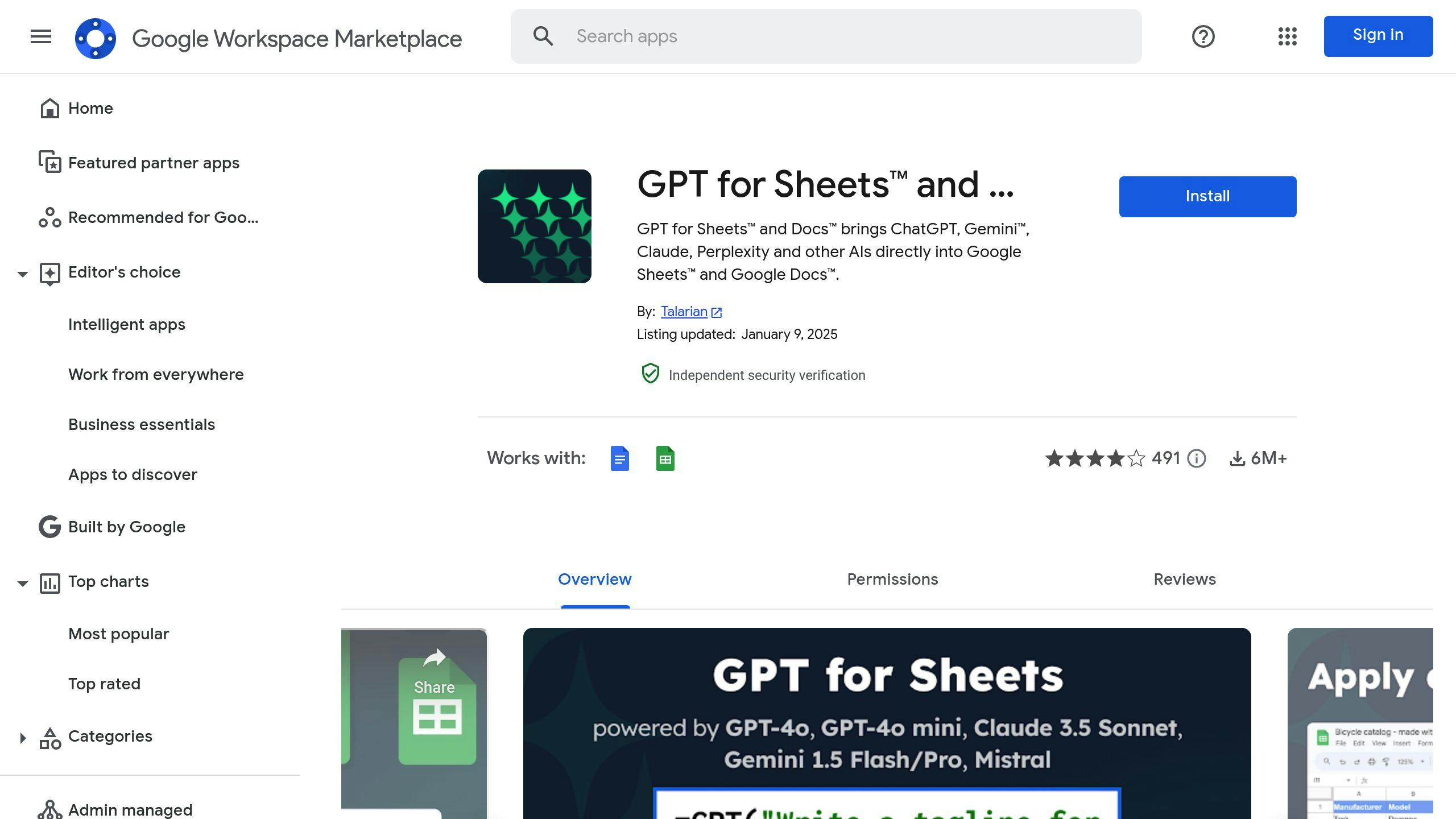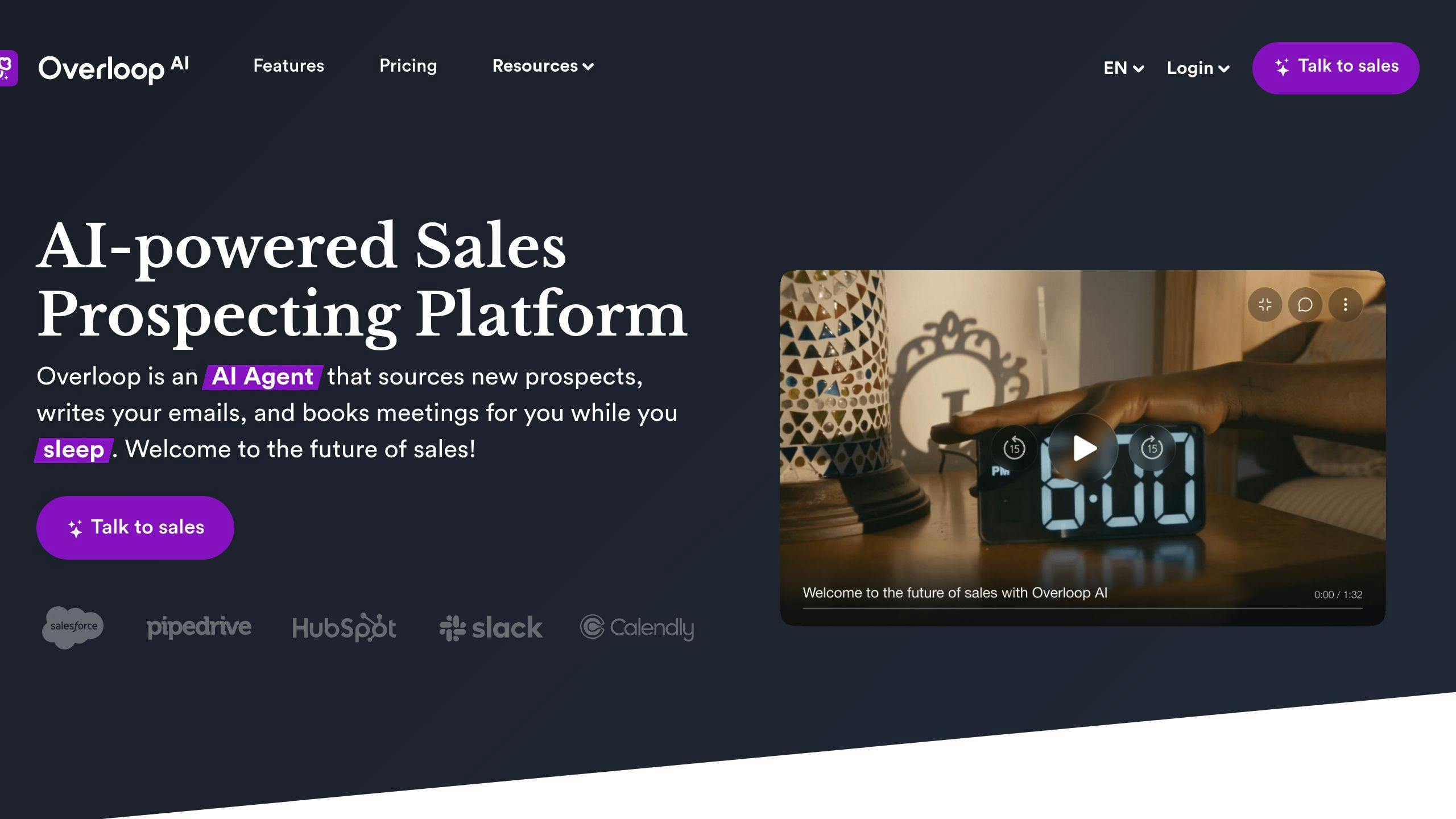AI-generated value propositions simplify and improve sales outreach by crafting tailored, data-driven messages that address customer needs. Here's what you need to know.
- What It Is: A value proposition explains how your solution solves customer problems and stands out from competitors.
- How AI Helps: AI analyzes customer data, personalizes messages, automates repetitive tasks, and learns from feedback to refine value propositions.
- Steps to Use AI:
- Define your target audience and objectives.
- Use AI to analyze data like customer interactions, purchase history, and competitor insights.
- Fine-tune AI outputs for accuracy, brand consistency, and performance.
- Best Practices: Focus on buyer personas, iterate based on feedback, and maintain transparency and ethics.
How to Use GPT For Sheets To Create Tailored Value Proposition Messaging For Sales

Steps to Create AI-Generated Value Propositions
AI can simplify and improve the process of creating value propositions by tapping into data insights and scaling efforts efficiently. Here's how you can use AI tools to craft effective value propositions:
1. Define Your Target Audience and Objectives
Start by clearly identifying your ideal customer profile (ICP). This means analyzing your current customers and spotting shared traits. Focus on:
- Industry challenges and decision factors: What issues are they facing, and what drives their choices?
- Success metrics: What goals are they trying to achieve?
- Buyer personas: Gather demographic and psychographic details to paint a full picture.
This groundwork helps AI generate relevant and focused value propositions.
2. Leverage AI for Data Analysis
AI can process data from various sources to uncover actionable insights:
| Data Type | Insights Generated | Business Impact |
|---|---|---|
| Customer Interactions | Preferences for engagement | More personalized outreach |
| Purchase History | Buying patterns and triggers | Better timing for offers |
| Website Activity | Content interaction trends | Sharper, targeted messaging |
| Competitor Data | Gaps in market positioning | Highlight unique strengths |
These insights ensure your value propositions are backed by real data.
3. Fine-Tune AI-Generated Results
AI outputs need to be polished to align with your brand and sales strategies. Focus on:
- Quality Check: Confirm the AI-generated content is accurate and addresses customer pain points effectively.
- Brand Consistency: Make sure the tone and language match your brand’s voice while keeping the core message intact.
- Performance Metrics: Test engagement and conversion rates to refine and improve the messaging over time.
Integrating AI into Sales Prospecting Workflows
Using Platforms like Overloop AI

Sales prospecting has taken a leap forward with platforms that combine AI-driven tools and streamlined outreach features. For example, Overloop AI simplifies the process with tools like automated list building, multi-language content creation, and integration across multiple outreach channels. It also provides access to a massive B2B database of over 450 million contacts, making it easier to find and connect with prospects.
Automation and Personalization in Outreach
AI makes it possible to personalize outreach on a large scale. By analyzing data about prospects, the technology crafts messages that feel tailored to specific audience groups. Messages adapt automatically based on factors like industry, company size, or the prospect’s role, ensuring they address the most relevant needs and priorities.
Some key factors that influence personalization include:
- Industry Trends: Messaging aligns with the challenges and opportunities in a specific sector.
- Growth Stage: Targets the unique pain points of businesses at different stages of maturity.
- Technology Stack: Highlights how your solution integrates with the tools a prospect already uses.
- Recent News: References timely developments, such as a company’s latest achievements or announcements.
This mix of automation and personalization allows sales teams to expand their reach without sacrificing quality. AI-powered workflows handle the time-consuming tasks, freeing up teams to focus on creating precise, data-backed messages that resonate with prospects.
Once AI is part of your prospecting process, the next step is to refine your approach and adopt strategies that ensure your messaging stands out.
Best Practices for AI-Generated Value Propositions
Focus on Buyer Personas
AI is great at analyzing customer data to identify patterns tied to buyer personas. This includes factors like industry-specific challenges, company size, decision-maker roles, and technology preferences. By combining AI insights with detailed persona profiles, you can create messages that directly address their needs and goals.
Once your value propositions are aligned with these personas, it's essential to keep refining them based on how they perform.
Iterate Based on Feedback
Improving your AI-generated value propositions requires ongoing adjustments. Keep an eye on performance metrics and listen to customer feedback to make your messaging stronger over time:
| Metric Type | What to Monitor | Why It Matters |
|---|---|---|
| Engagement | Open rates, click-through rates | Shows how appealing your message is |
| Response | Replies, meeting bookings | Reflects how well your message resonates |
| Conversion | Sales progress, deals closed | Links your messaging to revenue growth |
These insights can help you fine-tune your AI models and adapt your value propositions. Throughout this process, it's crucial to prioritize ethical practices in your AI-driven strategies.
Maintain Transparency and Ethics
As you refine your messaging, ensure it aligns with ethical and transparent practices. Being upfront about using AI and sticking to truthful communication builds trust and protects your reputation.
Key points to keep in mind:
- Avoid exaggerations or false claims
- Safeguard customer data and privacy
- Stay true to your brand's voice
- Be clear about where and how AI is used
AI should support - not replace - genuine human interaction in sales. Use it to enhance personalization while keeping your communication honest and relatable.
Conclusion: The Future of AI-Generated Value Propositions
Key Takeaways
AI is reshaping sales outreach by delivering personalized, data-driven value propositions that truly connect with prospects. By blending automation, real-time feedback, and tailored insights, AI boosts both the efficiency and impact of sales communications.
LivePerson's experience highlights how integrating AI into account planning can lead to better engagement with prospects [2]. Their results show how AI tools improve targeting and response rates while still maintaining genuine connections.
Future Potential
AI's role in sales is heading toward hyper-personalization, with tools that can predict buying moments and fine-tune outreach timing [1]. While these advancements are already making waves, the future promises even more possibilities.
AI integration is stretching across the entire sales journey - from identifying prospects to closing deals. This growth is paving the way for tools that can:
- Anticipate and address customer needs
- Streamline outreach across multiple channels
- Scale personalized messaging
- Time interactions based on behavioral cues
As these systems become more advanced, businesses will need to balance innovation with ethical considerations. Transparency and trust will be key to keeping sales interactions both effective and human. The challenge lies in using AI's analytical power to solve customer pain points while being upfront about its involvement.
Moving forward, combining automation with human oversight will ensure that AI-driven value propositions remain impactful and relevant. Striking this balance will help sales teams craft timely, meaningful messages that support long-term business growth.
FAQs
Can AI write a sales pitch?
Yes, AI can create sales pitches by analyzing data and generating tailored messaging. However, human input is needed to fine-tune and personalize the final version.
What AI Does Well:
- Uses data to craft targeted messaging
- Maintains consistency across sales channels
- Speeds up the pitch creation process
Where Humans Step In:
- Adjust the tone and add personal touches to match the brand voice
- Check industry-specific terms for accuracy
- Ensure the pitch aligns with company messaging guidelines
AI provides a solid foundation for sales pitches, but human expertise is key to making them truly resonate. Tools like Overloop AI help bridge this gap by letting teams adjust AI-generated pitches based on real-world feedback.



